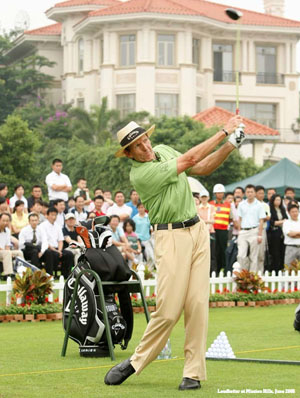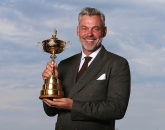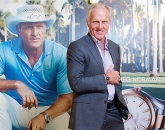HKG: You’re known as “the golf guru.” Is that a title you ever get used to?
DL: It's a nice accolade. I've been doing this for a long time with all sorts of different levels of players, but the fact of the matter is I'm still learning. That's the great thing about it. There's so much to know about the mind and how it works, and now there's big studies in biomechanics to see how we can help people. We're in a technologically advanced age and we're sort of analyzing and dissecting everything we look at. But the danger with golf is that we over-think and get into the old syndrome of “paralysis through analysis.”
HKG: Indeed. But is that because there’s too much instructional material out there? You’ve written many books, dozens of other instructors have books out; the magazines are full of coaching tips...
 DL: The volume of material out there is just ridiculous— just to get that little white ball in the hole. You can certainly get suffocated by all the material. In the end, if you want to play good golf you've got to keep it simple, and that's why there's nothing better than having a one-on-one lesson. Yeah, you might get the odd tip from a magazine and that can help, but generally speaking it's best to get with somebody who really knows what they're talking about. But golfers are junkies—they are always looking for something that they think is going to help them.
DL: The volume of material out there is just ridiculous— just to get that little white ball in the hole. You can certainly get suffocated by all the material. In the end, if you want to play good golf you've got to keep it simple, and that's why there's nothing better than having a one-on-one lesson. Yeah, you might get the odd tip from a magazine and that can help, but generally speaking it's best to get with somebody who really knows what they're talking about. But golfers are junkies—they are always looking for something that they think is going to help them.
HKG: Obviously you’ve had an amazing successful career as an instructor, but do you ever think back to your own playing career? Presumably teaching wasn’t the goal when you became a professional?
DL: If I had my druthers, absolutely I'd rather be a world- class player than a world-class teacher. When I was 14 years old playing golf I didn't think: "Well, I want to be a great teacher." I just wanted to get out and play, but you realize that there's only a certain special few players that are going to be successful. The number of people that play golf around the world and the number of people that make a living out of it are few and far between. The damn game can drive you crazy, you know?
HKG: You must get stopped almost every day by a stranger asking for advice?
DL: And in the most strange places, too—like urinals. The guy beside me will say: “Hey, aren't you David Leadbetter? Can you help me with my grip?” I say: “Well, not right now, but yeah.” It's fun, though. People think that maybe I have the secret, and I sort of say: “Yeah, I do have the secret, but I only let it out occasionally—and for the right price.”
HKG: Which leads nicely onto my next question: how much for a day with Leadbetter?
DL: Well, I'm a bit like Robin Hood because I rob from the rich to give to the poor. I've got a lot of academies around the world, close to 30, but I don't have the time to be in one location. I do give instruction on a limited basis—and it’s expensive, absolutely, but I spend a lot of time with that person. On the other hand, I get a lot of kids or young pros who can't afford it and I'll basically work with them for nothing, so, you know, it just depends.
HKG: OK, well if one of our well-heeled readers wanted to book a day’s instruction with you, how much is it going to set him or her back?
DL: US$10,000.
HKG: How much golf do you actually play?
DL: I play about one full round of golf a month. I play a lot of nine holes when I’m out there teaching. I’m actually playing more than I used to.
HKG: But are you still playing for fun?
DL: Absolutely. As a teacher, you’re always trying to learn new things, new theories, so you have to try them out, which I find great fun. I would say I’ve taught better when I’ve been playing more.
HKG: But when you’re out there playing golf with presidents and other dignitaries, do you feel as though you have to hit every shot perfectly because that's what people would expect? That must add a little pressure...
DL: It does. The fact is everybody expects you to hit it like Ernie Els, and you think, "Jeez." But as the old saying goes: “Those that can, do. Those that can't, teach.”
HKG: Is that true?
DL: To some extent. It's bit of a joke, really, but there are some very fine players who've never fulfilled their potential and teach, and there's also some very fine players who play for a living and couldn't teach worth a darn because they can't communicate. So it's definitely a different branch of the profession.
HKG: Have your instruction methods changed as a result of the huge changes in equipment over the past ten to fifteen years?
DL: That’s a good question. Golf in an evolution. We’re not teaching the swing of Old Tom Morris, so yes equipment has altered the way we teach. But what everyone has to realize is that pro and amateur golf are two completely different games. Today the professional game is very much a power game, the players are more athletic. In Faldo’s days, the swing was geared around the iron, not the driver. Faldo was a big strong guy, but he wasn’t known for his length— he was a precision player; controlling his trajectory, the amount of spin he put on the ball. Today the modern swing is a driver swing. The emphasis is on getting the ball out there as far as possible—and that’s only possible because the clubs are more forgiving and more stable. You can really go at the ball hard with the modern equipment. Players of yesteryear were better iron players than those of today. Jack Nicklaus hit 7-iron 150-155 yards. Guys today are hitting the same club, although they’re slightly different lofts, 180 yards plus.
HKG: Is that something you ever worry about? Are clubs so easy to hit now that the integrity of the game has suffered?
DL: You could say they're making golf courses obsolete, but how do you stop progress? People would still be driving around in ox- drawn carts or something, you know? Besides, isn't golf still a difficult game? The standard of golf hasn't really improved to any great extent. I mean, yes, they hit more good shots and they probably hit some longer ones, and it's a little bit more forgiving, but golf is still very much a technique-oriented game.
HKG: You’ve never coached him, but could you talk a bit about Tiger?
DL: I’ll tell you something: if Tiger was using hickory shafts he’d still win. Tiger is a freak of nature. When he’s on song he’s basically unbeatable. He’s so much better than anyone else.
HKG: Can you explain why that is?
DL: Can you explain someone like Ayrton Senna? Sometimes you just get someone who has all the ingredients. I don’t know. It’s God given. Tiger is blessed with physique; he’s blessed with a tremendous work ethic, discipline, organization, which might have been supplied by his father. His mother supplied some of the Zen from the Eastern philosophies. He’s just got it—whatever “it” is. Tiger is so single-minded. When you put it all together you’ve got an unbelievable recipe.
HKG: And Michelle Wie? What’s going on there?
DL: Michelle Wie is definitely among the most talented young players I have ever been involved with. Unfortunately she has suffered through injuries. It takes years and years to build a reputation, but it certainly doesn’t take long for you to lose a reputation. Michelle’s star isn’t shining as bright as before. Unfortunately she tried to play through the injuries. She still has a great future, but there’s a lesson here for every parent, especially Chinese parents who might be relatively new to the game. While you want to support your child, you don’t want to push them too hard so that they become burnt out and mentally tired. Golf is like any other athletic sport. You have to be a great athlete. But you also need to rest. You can’t go out and practice all day every day. In Asian cultures, especially in China, the work ethic is tremendous. Working hard is very important, but resting hard is equally important. You have to recharge the batteries. Hopefully parents over here will understand this. Otherwise, you’ll get children who may be fantastic players at the age of 16, 17, 18, but they’ll be burnt out by their mid- 20s. They’ll have very short careers. Golfers generally mature at around the age of 30, but only if the right balance between work and rest is there.
HKG: The Olympics are in Beijing this summer. Would you have liked to have seen golf on the itinerary?
DL: Definitely. Golf in many countries is pretty stagnant, particularly in the United States. If golf was in the Olympics I think it would change the sport’s image dramatically. Golf is still considered an elitist game, but it can be brought to a much broader market, which is what the Olympics could do. The powers that be need to get together and make it happen. If they want to grow the game, the Olympics would be a tremendous vehicle to achieving that.











